Potřebujeme váš souhlas k využití jednotlivých dat, aby se vám mimo jiné mohly ukazovat informace týkající se vašich zájmů. Souhlas udělíte kliknutím na tlačítko „OK“.
ASTM D430-06(2012)
Standard Test Methods for Rubber Deterioration—Dynamic Fatigue
Automaticky přeložený název:
Standardní zkušební metody pro gumy zkaženého & ndash; Dynamic Únava
NORMA vydána dne 1.5.2012
Informace o normě:
Označení normy: ASTM D430-06(2012)
Poznámka: NEPLATNÁ
Datum vydání normy: 1.5.2012
Kód zboží: NS-26741
Počet stran: 10
Přibližná hmotnost: 30 g (0.07 liber)
Země: Americká technická norma
Kategorie: Technické normy ASTM
Kategorie - podobné normy:
Anotace textu normy ASTM D430-06(2012) :
Keywords:
crack growth, DeMattia flexing machine, DuPont flexing machine, flex fatigue, flexing, flexing fatigue, ply separation, rubber products, Scott flexing machine, Cracking--rubber, DeMattia flexing machine, Deterioration--rubber, Dupont flexing machine, Dynamic fatigue, Fatigue, Flexing fatigue, Ply separation, Rubber belting, Rubber textile composites, Scott flexing machine, Tire cords and tire cord fabrics, Tire testing, ICS Number Code 83.060 (Rubber)
Doplňující informace
| Significance and Use | ||||||||||||
|
Tests for dynamic fatigue are designed to simulate the continually repeated distortions received in service by many rubber articles, such as tires, belts, footwear, and molded goods. These distortions may be produced by extension, compressive, and bending forces or combinations thereof. The effect of the distortions is to weaken the rubber until surface cracking or rupture occurs. Where rubber is combined with other flexible materials such as fabric, the effect may be evidenced by separation at the interface between the materials, caused either by breaking of the rubber or failure of the adhesion or both. These tests are, therefore, of the following two types: Type I—Tests designed to produce separation of rubber-fabric combinations by controlled bending of the specimens. Type II—Tests designed to produce cracking on the surface of rubber by either repeated bending or extension as may occur in service. |
||||||||||||
| 1. Scope | ||||||||||||
|
1.1 These test methods cover testing procedures that estimate the ability of soft rubber materials to resist dynamic fatigue. No exact correlation between these test results and service is given or implied. This is due to the varied nature of service conditions. These test procedures do yield data that can be used for the comparative evaluation of rubber or composite rubber-fabric materials for their ability to resist dynamic fatigue. 1.2 The values stated in SI units are to be regarded as the standard. The values given in parentheses are for information only. 1.3 This standard does not purport to address all of the safety concerns, if any, associated with its use. It is the responsibility of the user of this standard to establish appropriate safety and health practices and determine the applicability of regulatory limitations prior to use. |
||||||||||||
| 2. Referenced Documents | ||||||||||||
|
Podobné normy:
Historická
1.5.2012
Historická
1.7.2009
Historická
1.11.2013
Historická
1.2.2011
Historická
1.5.2012
Historická
1.1.2010


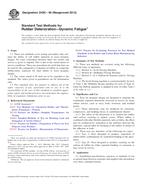
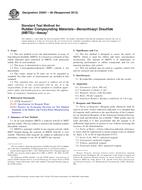 ASTM D5051-06(2012)..
ASTM D5051-06(2012)..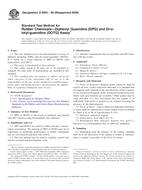 ASTM D5054-90(2009)..
ASTM D5054-90(2009)..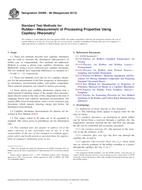 ASTM D5099-08(2013)..
ASTM D5099-08(2013)..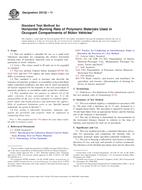 ASTM D5132-11
ASTM D5132-11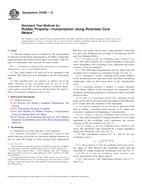 ASTM D5289-12
ASTM D5289-12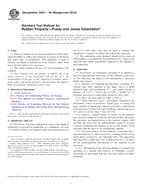 ASTM D531-00(2010)..
ASTM D531-00(2010)..
 Cookies
Cookies
